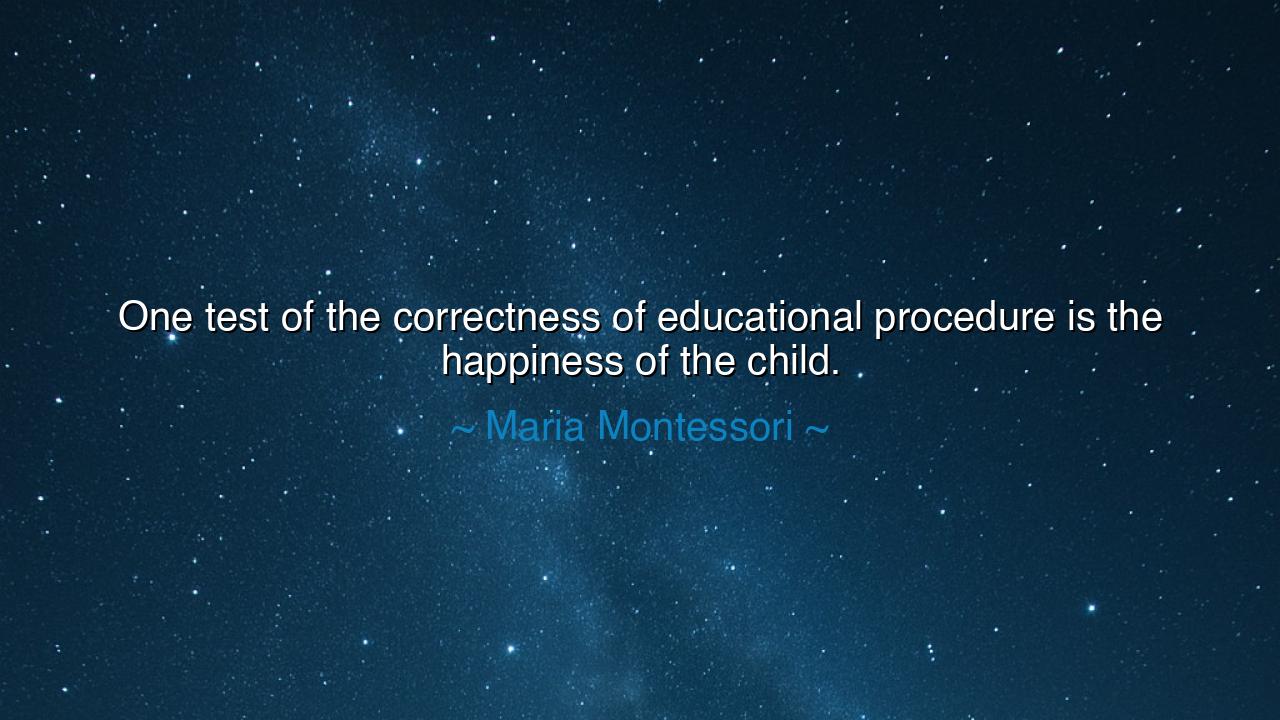
One test of the correctness of educational procedure is the






“One test of the correctness of educational procedure is the happiness of the child.”
Thus spoke Maria Montessori, the visionary teacher and philosopher who saw in every child not a vessel to be filled, but a light to be kindled. In this gentle yet profound declaration, she revealed the sacred measure of all education — not in grades or examinations, not in discipline or obedience, but in happiness. For what use is knowledge that does not bring joy? What value is wisdom that crushes the spirit of the learner? To Montessori, the true purpose of education was not to mold the child into conformity, but to liberate the soul that already lives within.
The origin of these words lies in Montessori’s lifelong work with children — especially those deemed “difficult” or “deficient” by the society of her time. In the early 1900s, when classrooms were rigid, silent, and ruled by authority, she entered the forgotten places where poor and disabled children were kept, and there she performed a quiet revolution. She observed, she listened, and she learned from the children themselves. What she discovered was astonishing: when given freedom, respect, and purposeful work, the children became calm, focused, and radiant with joy. Their happiness was not an accident — it was the natural flowering of the right environment. From this revelation grew the Montessori Method, which would spread across the world, changing forever the way we understand learning.
Montessori’s words remind us that education is not a system — it is a relationship. It is the meeting of the teacher’s wisdom with the child’s wonder. To test whether this meeting is right, she says, we must look not at performance, but at the child’s face. Is there joy in the eyes? Is there curiosity in the heart? Is there peace in the spirit? If there is happiness, then the procedure is correct. If there is fear, boredom, or pain, then something has gone astray. The wise teacher, therefore, is not one who commands, but one who listens; not one who fills the mind, but one who awakens the heart.
Consider, for a moment, the story of Helen Keller and her teacher, Anne Sullivan. When Anne first met Helen — blind, deaf, and locked within the silence of her own mind — she did not begin with lectures or punishments, as the world might have expected. Instead, she began with love. She reached through touch, patience, and play, teaching Helen not only words, but wonder — the thrill of discovering that the world could speak to her. The child who had once raged in darkness became filled with light and joy. Helen’s happiness was the proof that her education was true. In her smile, the world could see that Anne’s method — like Montessori’s — had touched the divine essence of learning itself.
Montessori’s teaching carries a warning, too. She saw how many systems, in their quest for order and achievement, crush the natural joy of learning. When a child’s day is ruled by fear of failure or the desire to please others, the heart grows weary. Knowledge without joy is like a flower without fragrance — it may be beautiful, but it does not nourish the soul. True education must awaken not only the intellect, but the sense of wonder that lives in all human beings. The happiest child is the one who learns because learning itself is a joy, not a duty. Happiness, then, is not the byproduct of education — it is its purpose and proof.
In this light, every parent, every teacher, every leader becomes a gardener of souls. The child, like a seed, contains within itself the pattern of its own growth; our task is not to force it, but to nurture it. The right soil, the right light, the right patience — these yield not obedience, but flourishing. When we guide with respect and love, the result is not rebellion or resentment, but gratitude and joy. Thus, the happiness of the child becomes a mirror, reflecting the moral beauty of the teacher’s heart and the wisdom of their methods.
So, my child, take this teaching of Maria Montessori and hold it close: the true test of any path — whether in teaching, in leading, or in living — is happiness. If your actions make others small, fearful, or weary, then your way is wrong. But if your presence kindles light in others — if your work brings peace to the heart and curiosity to the mind — then you walk the right road. Let joy be your compass, not just for children, but for all your dealings in the world.
And remember: education is not confined to classrooms, nor childhood to age. We are all learners in the vast school of life, and we are all teachers, whether we know it or not. Seek happiness in your learning, and help others find it in theirs. For as Montessori taught, when the heart is joyful, the mind opens, and in that union of joy and wisdom lies the greatest triumph of the human spirit.






AAdministratorAdministrator
Welcome, honored guests. Please leave a comment, we will respond soon